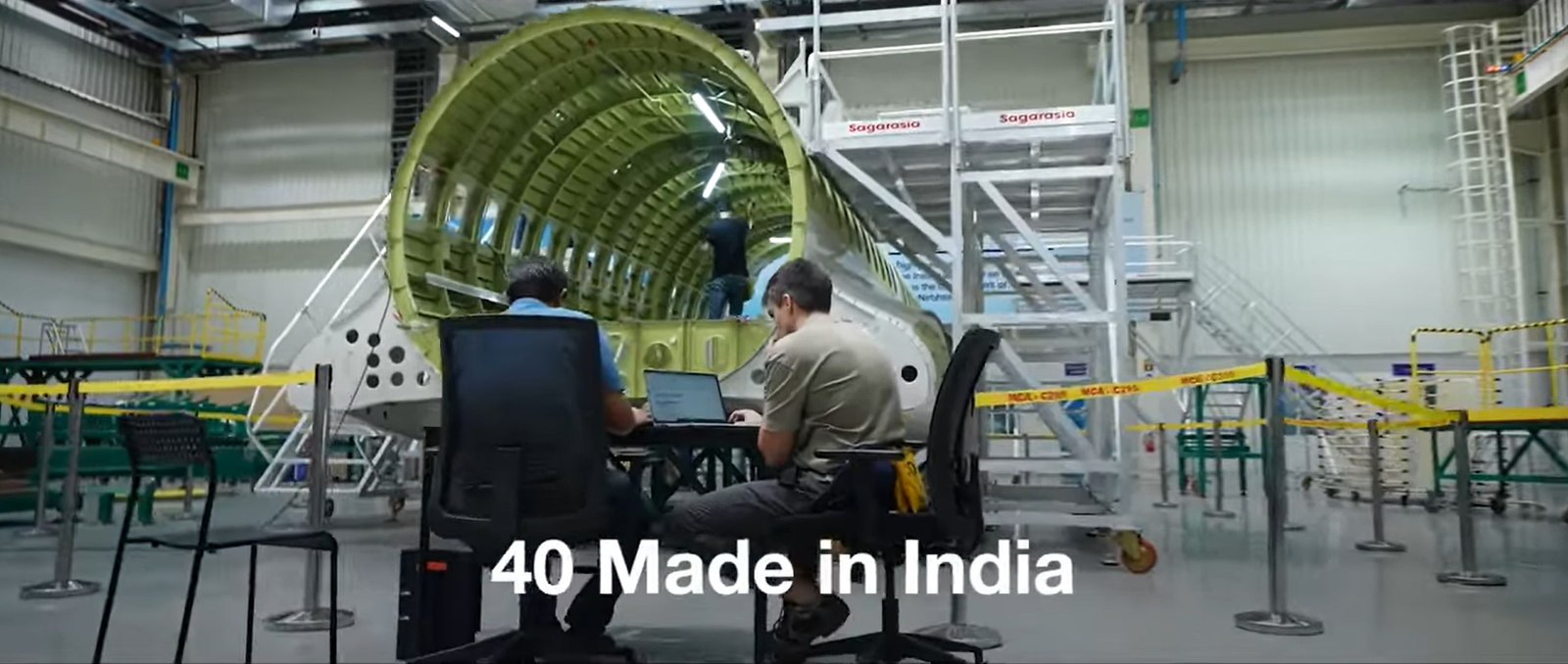
Vadodara, October 28, 2024: Marking a significant milestone in India’s aerospace and defense sector, Tata Advanced Systems Limited (TASL) and Airbus have inaugurated the final assembly line (FAL) for the Airbus C295 aircraft in Vadodara, Gujarat. This ambitious ‘Make in India’ project is aimed at delivering 56 C295 aircraft to the Indian Air Force (IAF) to replace its aging AVRO fleet. The facility was inaugurated by the Prime Minister of India, Shri Narendra Modi, along with the President of Spain, Pedro Sánchez Pérez-Castejón, in the presence of N. Chandrasekaran, Chairman of Tata Sons, and Michael Schoellhorn, CEO of Airbus Defence and Space.
Significance of the C295 Aircraft

The C295 is a highly advanced tactical transport aircraft designed to serve both military and humanitarian needs. Equipped with state-of-the-art avionics, enhanced range, and stability in challenging conditions, it is highly versatile for transporting troops, equipment, and supplies. Beyond military operations, the C295 is crucial in disaster relief and humanitarian aid, making it a valuable addition to the IAF’s operational capabilities.
This aircraft will enhance the IAF’s rapid response potential and contribute to India’s defense preparedness. Its modular design allows for the integration of various equipment, making it a multipurpose asset for different mission profiles.
A Major Step Towards ‘Atmanirbhar Bharat’
This project represents a significant advancement towards self-reliance in defense manufacturing. As India’s first private-sector aircraft final assembly line, this facility is expected to boost India’s domestic production capabilities and contribute directly to the ‘Atmanirbhar Bharat’ (Self-Reliant India) initiative. This project has enabled a major technology transfer from Airbus to TASL, ensuring that India’s aerospace industry reaches global standards.
Additionally, the Vadodara FAL will serve as a platform for developing key subsystems and engineering processes, strengthening India’s aerospace sector and boosting domestic suppliers and vendors.
Employment Generation and Skill Development
The facility is expected to generate thousands of jobs in Gujarat and surrounding areas, creating significant opportunities for highly skilled employment in the field of aerospace engineering and manufacturing. It will also foster training programs for workers, raising their skills to meet global standards in aircraft assembly.
Young engineers and technicians from India’s top technical institutions will find opportunities for hands-on training and career growth, contributing to a more skilled workforce for the aerospace industry.
A Symbol of India-Spain Strategic Collaboration

The inauguration of this FAL marks a new chapter in India-Spain strategic relations, particularly in the aerospace and defense sectors. The presence of the President of Spain underscores the importance of this collaboration, which not only strengthens India’s defense capabilities but also opens doors for future joint ventures.
This partnership exemplifies how international collaboration can drive advancements in high-tech industries, contributing to self-reliance and international cooperation.
Opportunities for Global Exports
The Vadodara FAL holds potential not only for domestic needs but also as a potential hub for exporting aircraft to other countries in Asia, Africa, and the Middle East. As the global demand for tactical transport aircraft grows, India could emerge as a key supplier in the aerospace sector, establishing itself in the global defense supply chain.
Towards Technical Self-Reliance
With this FAL, India will advance its technical capabilities in the aerospace sector. This project provides a base for more advanced aerospace manufacturing and strengthens India’s role in the global defense production supply chain.
Foundation for Future Projects

This assembly line is expected to extend beyond C295 production, potentially accommodating other high-tech defense and aerospace equipment production in the future. It also serves as a model for other international companies to establish production and assembly facilities in India, thereby fostering a sustainable defense ecosystem in the country.
Conclusion
The collaboration between Tata Advanced Systems and Airbus marks a historic achievement for India’s defense production industry. This project will inject new energy into initiatives like ‘Make in India’ and ‘Atmanirbhar Bharat,’ fueling technological development, job creation, and international partnerships in the aerospace sector.
The Vadodara assembly line will deliver C295 aircraft to the Indian Air Force, reinforcing India’s aerospace industry and paving the way for a self-reliant future in defense manufacturing.

Average Rating